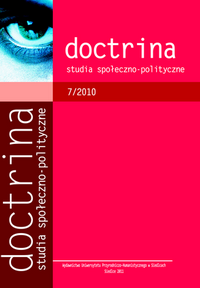Przeciwdziałanie zagrożeniom ładu demokratycznego w Unii Europejskiej
Abstract
This article examines security policy of the European Union in securing democratic order and preventing universal values and individual liberties against major threats, such as terrorism and crime. The analytical concept employed here is governance of internal security of the EU conceived of as a complex set of political activities undertaken by the member states, assisted by EU institutions, bodies and agencies, to secure high level of safety to EU citizens and legal aliens as well as to respect civil liberties and fundamental rights. For the EU’s identity as a security community is built on a common perception of threats and risks, EU security governance consists of complex, multitiered, geographically overlapping structures embedded into multilayered security regimes. Security policy is no longer state-centric, no less important is security generated on the societal level. However, the institutionalization of securitization processes, indispensable to accommodate state objectives with civic engagement and responsibility for maintaining democratic order, alters radically the perspective of security making in the face of new threats.




